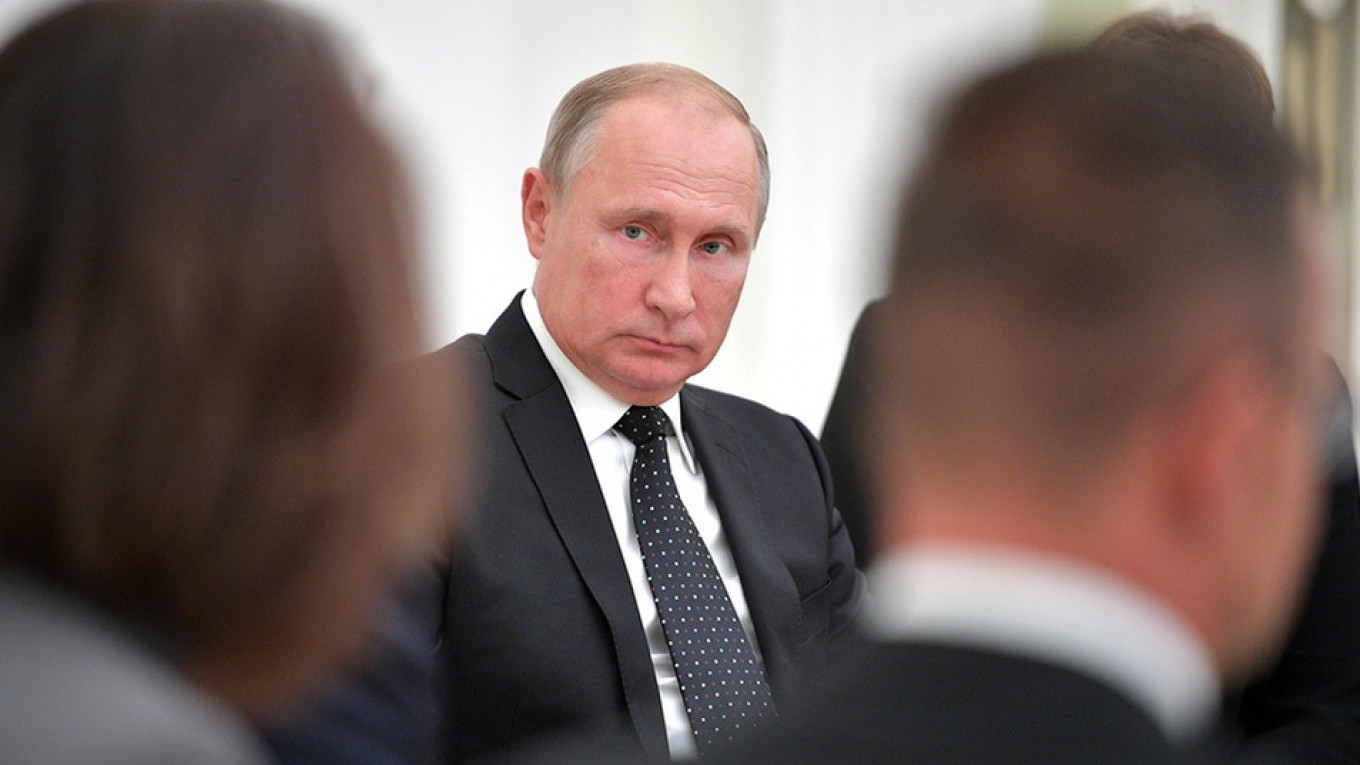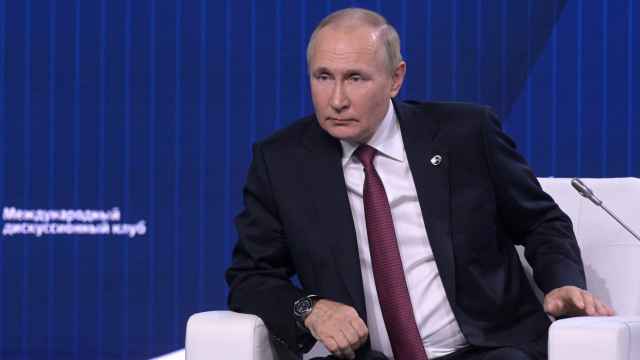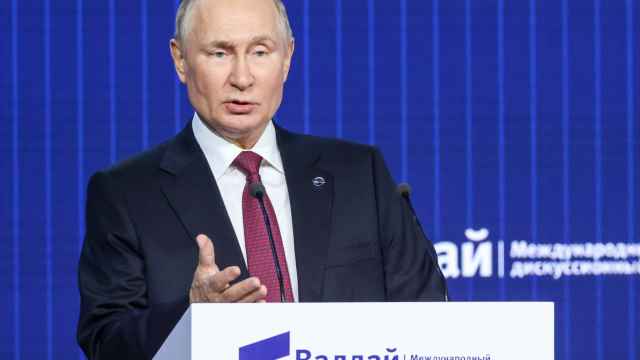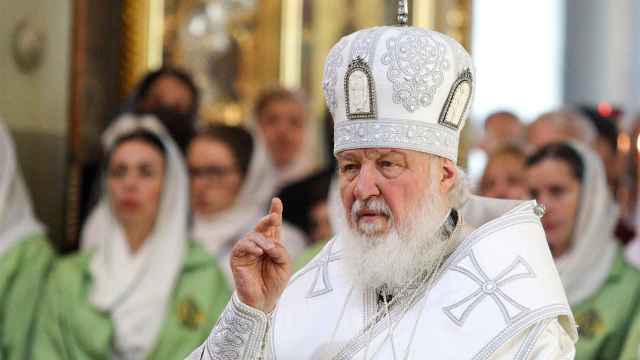It’s chilling when the leader of a nuclear power describes a potential nuclear conflict in terms one might expect from a suicide bomber. But the intellectual foundations of Russian President Vladimir Putin’s latest geopolitical utterances are even more unsettling: Putin’s policy wonks assume that the world can't hope for reasonable coordinated action to prevent catastrophic war.
Putin told a session of the Valdai Club, set up as a forum for Russian foreign-policy intellectuals to share their views with foreign colleagues, that Russia doesn’t believe in a preemptive nuclear strike but rather in an immediate, deadly response:
Yes, in this situation it appears as through we’re waiting for someone to use nuclear weapons against us, and we’re doing nothing ourselves. Well, yes. But then the aggressor must know anyway that retribution is inevitable, that he will be annihilated. And we’re the victims of aggression, and we’ll go to heaven as martyrs while they will just croak because they won’t even have the time to repent.
The last line was, perhaps, a Putinesque joke, but it’s difficult to joke on such a subject without being taken at least a little seriously. The current Russian military doctrine, which Putin signed in 2014, does, however, allow a nuclear strike even if nuclear weapons aren’t used against Russia.
“The Russian Federation,” it says, “reserves the right to use nuclear weapons in response to the use of nuclear and other weapons of mass destruction against it or its allies, as well as in the eventuality of a conventional attack against the Russian Federation when it threatens the very existence of the state.” Putin clearly doesn’t put much stock even in rules that he wrote himself; his vision, complete with pictures of heaven and hell, is metaphysical.
It’s a vision so fatalistic that, in contrast to previous annual Valdai Club appearances, Putin didn’t even try to hide his boredom as he answered familiar questions. He asked the moderator not to let the question-and-answer session run on too long. When a Japanese participant prepared to ask a question, Putin quipped, referring to a disputed Pacific island chain: “Will it be about the islands again? Not interesting.” And when the moderator asked if there was anything Putin wanted to change, he replied: “I want us finally to be done with this discussion, because I need to fly to Uzbekistan. And I want to play hockey before I go.”
At one point, Putin explained his fatalist credo as he discoursed on the nature of fear: “If you’ve decided something for yourself, if you’ve made a choice, you must act without looking over your shoulder at any negative consequences for you personally. You have to think about positive consequences for those you’re doing it for.”
Putin is tired of any and all discussion. He’s already made all his decisions. It’s not just his visceral reaction to being in power after more than 18 years, though. The moderator of Thursday’s session, political scientist Fyodor Lukyanov, and a team of other well-known Russian intellectuals with links to the Valdai Club, wrote in the club’s report for this year’s session that all attempts to forge a workable global system have failed and it’s everyone for themselves now:
The fork at which an effectively functioning international order based on global governance is behind us. The world has moved on in a different direction. It has slid into an era of unilateral decisions. It’s an objective trend, it cannot be managed.
The decline of the United Nations, U.S. President Donald Trump’s trade wars, the extension of the nuclear deterrent to smaller countries such as North Korea (which the authors call “good news”), migration-related squabbles — all these, to Lukyanov and collaborators, are signs that “states are becoming more egoistical.” In this free-for-all, nations must be able to change partners quickly rather than rely on long-term alliances.
“Those whose reactions are quicker and more precise can benefit from such a situation,” the Valdai Club intellectuals wrote. There is no “right side of history” anymore, no universal ethical and moral norms, no progressive forms of government and of legitimizing rulers.
The reassuring part of this vision is that in a world of national egoisms, big wars make little sense, and war, according to Lukyanov and collaborators, is shifting into cyberspace. But if Putin shares the concept of a world in which everything is in flux, and it’s likely that he does because the Valdai Club experts are part of his brain trust, it might also explain why he’s talking about nuclear war in religious rather than practical terms: It’s an accident of mutually assured destruction in a paradigm of accidents and limitless opportunism.
Leonid Bershidsky is a Bloomberg View columnist, the founding editor of the Russian business daily Vedomosti and the founder of the opinion website Slon.ru. The views and opinions expressed in opinion pieces do not necessarily reflect the position of The Moscow Times.
A Message from The Moscow Times:
Dear readers,
We are facing unprecedented challenges. Russia's Prosecutor General's Office has designated The Moscow Times as an "undesirable" organization, criminalizing our work and putting our staff at risk of prosecution. This follows our earlier unjust labeling as a "foreign agent."
These actions are direct attempts to silence independent journalism in Russia. The authorities claim our work "discredits the decisions of the Russian leadership." We see things differently: we strive to provide accurate, unbiased reporting on Russia.
We, the journalists of The Moscow Times, refuse to be silenced. But to continue our work, we need your help.
Your support, no matter how small, makes a world of difference. If you can, please support us monthly starting from just $2. It's quick to set up, and every contribution makes a significant impact.
By supporting The Moscow Times, you're defending open, independent journalism in the face of repression. Thank you for standing with us.
Remind me later.








